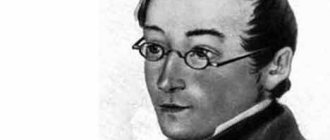Notch your nose - your nose is for smelling, not for defloring other people's affairs.
The face is what grew around the nose.
My nose itched... my liver trembled.
5 / 5 ( 1 voice )
And I found that person who sits with his nose buried in my hair, gently hugs me, carries me in his arms and calls me “his girl”! This is our kind of love!
Do you, too, when you sit in the hairdresser’s chair and they cover you with a cape, do your nose start to itch terribly?
I'm happy that you're with me, you can rub your nose on my cheek. And thank you for giving me a heart this spring.
A true friend will always scratch her nose or head when your nails are painted!
Often happiness is sought in the same way as glasses: when they are on the nose.
The lower man soul, the higher nose up. He reaches with his nose to where his soul has not grown.
Let's drink to a white back, a red nose, and to the fact that those who laugh well laugh without consequences.
Hold it! Downwind - nose! Pistol - tail! Yourself - in your hands! Mouth shut! Head - in the cold!
Statuses about the nose with meaning
If you look at the sky more often, you can see a lot of interesting things. And if you look more at your feet, you won’t get a bloody nose.
Those who don't stick their noses everywhere can breathe easier.
Go through life with your head held high, but not with your nose in the air!
The best age for children is when you no longer lead them by the hand, and they have not yet led you by the nose!
No matter how many doors close in front of your nose, there is one that is meant only for you.
If you see that you need help, stick your nose in, not your hands...
Poem "Dead Souls". Famous quotes and excerpts from the work
“Dead Souls” is one of Gogol’s most important works, which the author himself designated as a “poem”. It was originally conceived as a three-volume work. The first volume, entitled “The Adventures of Chichikov, or Dead Souls,” was published in 1842. The almost finished second volume was destroyed by the writer in 1845, but several chapters were preserved in drafts, which were published as part of the Complete Works of Gogol in 1855. The third volume was conceived and not started; only fragmentary information remained about it.
“Many of Gogol’s contemporaries, those who knew him personally, said that he was haunted by a sense of his own importance. He perceived himself as a man who was called to some great cause. His book “Dead Souls” became this great deed. Dmitry Bak, philologist, critic
Lecture by Dmitry Petrovich Bak - philologist, critic, journalist, teacher at the Moscow Art Theater School, director of the State Literary Museum. www.culture.ru/movies
Gogol treated this work of his as a “sacred testament of the poet” and a literary feat, which at the same time has patriotic significance, “should reveal the fate of Russia and the world.” The writer depicts Russia as a country deeply affected by vices and corruption, but it is precisely this poverty and sinfulness that constitute the metaphysical background of its revival.
- Nothing could be more pleasant than living in solitude, enjoying the spectacle of nature and sometimes reading a book... Chichikov
- God provided himself with the work of creation as the highest pleasure, and also requires from man that he be the creator of prosperity and the harmonious flow of affairs.
- I know that there are some of us who are ready to laugh with all our hearts at a person’s crooked nose and do not have the courage to laugh at a person’s crooked soul.
- And what do I really think: sometimes, really, it seems to me that the Russian person is some kind of lost person. You want to do everything, but you can’t do anything. You keep thinking - from tomorrow you will start a new life, from tomorrow you will go on a diet - nothing has happened: by the evening of the same day you will have eaten so much that you can only blink your eyes and your tongue will not move; you sit like an owl, looking at everyone, really! And that's all.
- We all have a small weakness to spare ourselves a little, but let’s try better to find some neighbor on whom to take out our frustration.
- There is only one decent person there: the prosecutor; and even that one, to tell the truth, is a pig.
- I know them all: they are all scammers, the whole city there is like this: the scammer sits on the scammer and drives the scammer.
- There are people who have a passion to spoil their neighbor, sometimes for no reason at all.
- Countless, like the sands of the sea, are human passions, and all are different from one another, and all of them, low and beautiful, are at first submissive to man and then become his terrible rulers.
- Duty is a sacred matter for me, the law - I am dumb before the law.
- Youth is happy because it has a future.
- Everything quickly turns into a person; Before you have time to look back, a terrible worm has already grown inside, autocratically turning all the vital juices to itself.
- And what Russian doesn’t like driving fast? Is it possible for his soul, striving to get dizzy, to go on a spree, to sometimes say: “Damn it all! “—is it his soul not to love her? Isn’t it possible to love her when you hear something enthusiastically wonderful in her? It seems that an unknown force has taken you on its wing, and you are flying, and everything is flying: miles are flying, merchants are flying towards you on the beams of their wagons, a forest is flying on both sides with dark formations of spruces and pines, with a clumsy knock and the cry of a crow, it flies the whole road goes to God knows where into the disappearing distance, and something terrible is contained in this quick flickering, where the disappearing object does not have time to appear - only the sky above your head, and the light clouds, and the rushing month alone seem motionless. Eh, three! bird three, who invented you? to know, you could only have been born among a lively people, in that land that does not like to joke, but has spread out smoothly across half the world, and go ahead and count the miles until it hits your eyes. And not a cunning, it seems, road projectile, not covered with an iron screw, but hastily equipped and assembled alive with one ax and a chisel by an efficient Yaroslavl man. The driver is not wearing German boots: he has a beard and mittens, and sits on God knows what; but he stood up, swung, and began to sing - the horses were like a whirlwind, the spokes in the wheels mixed into one smooth circle, the road only trembled, and a stopped pedestrian screamed in fear - and then she rushed, rushed, rushed! . And you can already see in the distance, something dusty and boring into the air. Is it not so for you, Rus', that you are rushing along like a brisk, unstoppable troika? The road beneath you smokes, the bridges rattle, everything falls behind and is left behind. The contemplator, amazed by God's miracle, stopped: was this lightning thrown from the sky? What does this terrifying movement mean? and what kind of unknown power is contained in these horses, unknown to the light? Oh, horses, horses, what kind of horses! Are there whirlwinds in your manes? Is there a sensitive ear burning in every vein of yours? They heard a familiar song from above, together and at once tensed their copper chests and, almost without touching the ground with their hooves, turned into just elongated lines flying through the air, and rushing, all inspired by God! . Rus', where are you going? Give an answer. Doesn't give an answer. The bell rings with a wonderful ringing; The air, torn into pieces, thunders and becomes the wind; everything that is on earth flies past, and, looking askance, other peoples and states step aside and give way to it
- Where is the one who would be able to tell us this omnipotent word forward in the native language of our Russian soul? who, knowing all the powers, and properties, and all the depth of our nature, with one magical wave could direct a Russian person to a high life? With what words, with what love would a grateful Russian person pay him? But centuries pass after centuries; Half a million Sidneys, bumpkins and boibaks sleep soundly, and rarely is a husband born in Rus' who knows how to pronounce it, this almighty word.
Winged words and phrases from the work “Dead Souls”
- And what Russian doesn’t like driving fast?
- Often, through the laughter visible to the world, tears flow invisible to the world.
- But in life everything changes quickly and vividly...
- Rus', where are you going? Give an answer! Doesn't give an answer.
- It is very dangerous to look deeper into women's hearts.
- Love us black, and everyone will love us white.
- Eh, Russian people! He doesn't like to die his own death!
- The swindler sits on the swindler and drives the swindler.
- How can you fight a bull and still not get milk from him?
- Fear is stickier than the plague.
- I'm speechless before the law.
- The lady is pleasant in every way.
- From a beautiful distance.
- Historical
- The province has gone to write!
- Three bird.
Funny statuses about the nose
Optimism is a handkerchief that can wipe the nose of any problem!
An itchy nose means drinking. Itches in the groin - see a doctor. Itching *oops - to adventure!
Every night I cry, bury my nose in the pillow and think about him. About that asshole who planted those fucking poplars under my window.
If your nose itches and you have nothing to drink, all trust in folk superstitions disappears...:)
According to the helicopter, the plane is turning its nose up too much.
Funny statuses about the nose
Stuffy nose. Now I don’t know which socks are clean.
New Year - tangerine in my mouth! Santa Claus - Olivier on my nose!
If your left hand itches - it means money, if your nose - means booze, if both - it means free booze.
Who is the nicest, most beautiful and smartest in the world? A rhetorical question if the barrel is pointing into the nose!
Few people have thought about it, but clowns are always poking their noses into things that aren’t theirs.
I nuzzled my daughter and realized what happiness smells like. I nuzzled my husband and realized who was stealing my shower gel.
A drop of nicotine kills a horse, but a drop of heroin makes it scratch its nose with its hoof.
Better a bird in your hands than in your nose.
“Blood for blood,” the girl said after the first sex, breaking the guy’s nose.
Wow, what eyes! Wow, what eyebrows! Wow, what sponges! Oh my God, what a nose!
Hello Dedushka Moroz! I'll break your nose! Your gifts have already given me diarrhea for five days...
Procitaty.ru - all quotes in one place.
On this page you will find quotes from Gogol Nose; you will definitely need this information for your overall development.
But Russia is such a wonderful land that if you talk about one collegiate assessor, then all the collegiate assessors, from Riga to Kamchatka, will certainly take it personally. Understand the same about all titles and ranks.
***
With a feeling of inexplicable fear, he rushed to the table and pulled up the mirror, so as not to somehow put his nose crooked. His hands were shaking. Carefully and prudently he placed it in its original place. Oh God! The nose did not stick!.. He brought it in his mouth, warmed it slightly with his breath and again brought it to the smooth place located between his two cheeks; but the nose did not hold up in any way.
***
Do me a favor,” Kovalev said in a pleading voice, “is there a remedy?” attach it somehow; even if it’s not good, just to hold on; I can even prop it up slightly with my hand in dangerous cases. Moreover, I don’t dance, so that I could cause harm with some careless movement. Everything that concerns gratitude for visits, rest assured, as much as my funds will allow...
***
“Do you believe,” said the doctor in a voice neither loud nor quiet, but extremely responsive and magnetic, “that I never treat for self-interest.” This is contrary to my rules and my art. True, I charge for visits, but only so as not to offend by my refusal. Of course, I would stick your nose in; but I assure you on my honor, if you don’t already believe my word, that it will be much worse. It’s better to let nature itself act. Wash with cold water more often, and I assure you that, without a nose, you will be as healthy as if you had one. I advise you to put your nose in a jar of alcohol or, even better, pour two tablespoons of hot vodka and heated vinegar into it - and then you can charge a fair amount of money for it. I’ll even take it myself, if you just don’t raise the price. But there is nothing lasting in the world, and therefore the joy in the next minute after the first is no longer so alive; in the third minute it becomes even weaker and finally imperceptibly merges with the ordinary state of the soul, just as a circle on water, created by the fall of a pebble, finally merges with a smooth surface.
***
Major Kovalev came to St. Petersburg out of necessity, namely to look for a place decent for his rank: if possible, then a vice-governor, or else an executor in some prominent department. Major Kovalev was not averse to getting married, but only in such a case when the bride would receive two hundred thousand in capital.
***
He didn't know what to think about such a strange incident. How is it really possible that the nose, which only yesterday was on his face, could not ride or walk, was in uniform!
***
You see, it’s indecent for me to walk around without a nose.
***
After all, you are my own nose! The nose looked at the major, and his eyebrows frowned somewhat. - You are mistaken, my dear sir. I am on my own. Moreover, there cannot be any close relations between us. Judging by the buttons on your uniform, you must serve in another department.
***
Kovalev came closer, stuck out the cambric collar of his shirtfront, straightened his signets hanging on the gold chain and, smiling around, drew attention to the light lady who, like a spring flower, bent slightly and raised her little white hand with translucent fingers to her forehead.
***
With a feeling of inexplicable fear, he rushed to the table and pulled up the mirror, so as not to somehow put his nose crooked. His hands were shaking. Carefully and prudently he placed it in its original place. Oh God! The nose did not stick!.. He brought it in his mouth, warmed it slightly with his breath and again brought it to the smooth place located between his two cheeks; but the nose did not hold up in any way.
***
Do me a favor,” Kovalev said in a pleading voice, “is there a remedy?” attach it somehow; even if it’s not good, just to hold on; I can even prop it up slightly with my hand in dangerous cases. Moreover, I don’t dance, so that I could cause harm with some careless movement. Everything that concerns gratitude for visits, rest assured, as much as my funds will allow...
***
“Do you believe,” said the doctor in a voice neither loud nor quiet, but extremely responsive and magnetic, “that I never treat for self-interest.” This is contrary to my rules and my art. True, I charge for visits, but only so as not to offend by my refusal. Of course, I would stick your nose in; but I assure you on my honor, if you don’t already believe my word, that it will be much worse. It’s better to let nature itself act. Wash with cold water more often, and I assure you that, without a nose, you will be as healthy as if you had one. I advise you to put your nose in a jar of alcohol or, even better, pour two tablespoons of hot vodka and heated vinegar into it - and then you can charge a fair amount of money for it. I'll even take it myself if you don't raise the price.
The main characters and their characteristics
The system of images in the story “The Nose” separated from the book and ran into the table of the Many-Wise Litrekon:
| heroes of the story "nose" | characteristic |
| Platon Kovalev | Caucasian collegiate assessor. an empty, vulgar and ignorant person who craves only career advancement and a bride with a good dowry. likes to call himself major. a rather arrogant person towards those below him on the social ladder. he is timid in front of his superiors, he even babbled in front of his own nose, because he was higher in rank. |
| nose | part of Kovalev's body that has separated from its owner. has its own consciousness, can speak and even frown. devout. for some time he successfully fooled those around him, posing as a state councilor, but failed due to poorly forged documents. the nose is successful in business thanks to its arrogance and the blindness of those around them, who are ready to accept even the nose if it has rank. |
| Ivan Yakovlevich | barber. an unkempt and rude person. prone to drunkenness. He is terribly afraid of attracting the attention of the authorities, which is why he is even ready to leave Kovalev without a nose for life. |
| image of the city | St. Petersburg is presented in its noisy and bustling diversity: there are people everywhere, hubbub, hustle and bustle, but no one cares about a person and his troubles. Kovalev faces monstrous indifference and cynicism. The townspeople are indifferent to the point of blindness: mistaking the nose for a full-fledged person, they demonstrate that they are ready to accept anyone, as long as he has rank. no one pays attention to personality, and all relationships in the capital are built on formalism and calculation. |
History of creation
The history of writing the story “The Nose” presents some very interesting facts:
- The idea for the story “The Nose” came to the writer after his long stay in St. Petersburg in the thirties. Having arrived from the distant Poltava province, Gogol was very disappointed in the capital's life with its fussiness and indifference of people to each other. These impressions, combined with Gogol’s failure as an actor, forever formed his opinion of St. Petersburg as an evil and cruel city.
- It was under the influence of these experiences that the story “The Nose” was created in 1835. A.S. himself helped Gogol in publishing the work. Pushkin, and in 1836 it was published in the Sovremennik magazine.
- The Moscow Observer magazine officially rejected Gogol's manuscript. The editors called the story “bad, vulgar and trivial.”
- The story was received not only from the editors, but also from the censorship. Some scenes were rewritten under the strict control of the inspection organization. So, the Nose and its owner were supposed to meet not in the Kazan Cathedral, as in the original, but in Gostiny Dvor.
- Initially, the author explained the fantastic events from the book by saying that the hero had a terrible dream, but then he decided to abandon the explanation.
The essence: what is the work about?
The story begins with how the barber Ivan Yakovlevich finds the nose of his friend and client, the collegiate assessor Kovalev, in a loaf of bread. Horrified and wanting to avoid problems, Ivan throws his find into the Neva.
On the same day, Kovalev is discovered missing. Going out into the street, he suddenly stumbles upon his own nose, which has taken on a life of its own, put on the uniform of a state councilor and calmly drives around St. Petersburg. The nose clearly does not want to return to its place and at the first opportunity hides from Kovalev.
The hero rushes to the newspaper editorial office to submit an application, but the official refuses to help, not wanting to drag the newspaper into a scandal and harm its reputation. The private bailiff, who, being out of sorts, did not even listen to him, was also completely indifferent to Kovalev’s problem.
In despair, Kovalev returns home, considering his life over. Salvation comes in the form of a police officer, who returns the hero’s nose, who tried to leave for Riga with a fake passport.
However, the nose resolutely refuses to return to its place. The situation cannot be corrected even by the intervention of a doctor, who, as it turns out, never helps anyone, but only takes money for an appointment.
Kovalev suspects that Alexandra Podtochena is to blame for all his misadventures, who thus wants to marry him to her daughter, but these suspicions are not confirmed.
Kovalev and his nose find themselves under the close attention of all the gossips and onlookers in the city. After some time, the nose, fortunately for the hero, grows back to his face, and Kovalev’s life returns to normal.
Criticism
The intelligentsia of that time reacted very keenly to Gogol's creation. A.S. himself Pushkin helped publish the book in Sovremennik, calling it incredibly original, funny and unexpected.
The story did not pass by Vissarion Belinsky, who saw in it an extremely relevant social commentary, condemning the inertia and bureaucracy of Russian society. He was also supported by S.G. Bocharov, who argued that the author forced people to face the truth. V.V. Nabokov considered “The Nose” one of Gogol’s most successful creations.
However, not everyone shared this enthusiasm. For example, N.G. Chernyshevsky called the story an old “anecdote,” and believed that Gogol did not come up with anything new, but simply retold the old.
Author: Mikhail Shchepin
Problems
The problems of the story “The Nose” are well known to every modern resident of Russia:
- Honor for rank
- using the example of Kovalev himself, who was embarrassed in front of his own nose only because he was dressed in the uniform of a state councilor, Gogol showed to what extremes veneration for rank had reached in the Russian Empire. The uniform acquires such power that it misleads not only Plato, but everyone around him. In a uniform, even the nose becomes a significant and respected face. - Drunkenness
- using the example of Yakovlev, the writer shows that drunkenness is characteristic of degenerate people and always goes side by side with cowardice and sloppiness. - Subservience
- the inhabitants of St. Petersburg in Gogol's story are shown as suppressed individuals, unconditionally obeying orders and blindly obeying their superiors, only because of their status, and not their own beliefs. - Ignorance
- the author shows people living with the lowest needs, not thinking about anything lofty, unable to look beyond the boundaries set for them by society and the state. - Inner emptiness
- the inner world of all the characters in the story is empty and wretched. They have long been mired in selfishness and laziness. All they care about is a stable income and inner peace, and nothing can dispel this desire, not even the suffering of other people, to whom the heroes are absolutely indifferent. - Bureaucracy
- the image of the Russian bureaucrat - is a frequent guest in Gogol's works. "Nose" is no exception. The writer shows us officials who do not strive to help people and rule the country, which is their duty, but to build their own carefree life and not do anything that could harm themselves. Gogol’s bureaucracy has taken over people’s lives so much that Kovalev’s nose is exposed not by obvious external signs, but by a fake passport. - Vulgarity
- in the souls of St. Petersburg residents depicted by Gogol there is no place for sincere affection and love. They are obsessed with cold calculation and a blind desire to satisfy their base needs.
Meaning
Gogol showed us the typical inhabitants of his time. Average officials, shopkeepers, newspapermen and other philistines represent a real kaleidoscope of rudeness, vulgarity, greed and spiritual weakness, which the writer mercilessly branded for most of his life. This is the main idea of the story “The Nose” - a condemnation of the real vices of society through the grotesque and fantastic assumption.
According to Gogol, the capital concentrated in itself the worst features of Russian reality, which have now become so everyday and ordinary that it is simply impossible to imagine the life of Russia without them. Gogol's main idea in the story "The Nose" is a demonstration that people have become hostages of formalism and bureaucracy, and now every creature is assessed only by its uniform, and not by its essence.
Themes
The theme of Gogol's story "The Nose" is also very capricious and prefers to roam freely on this page. If she has annoyed you, complain about her to the Many-Wise Litrekon in the comments:
- The city
of St. Petersburg in the story is presented as a bustling and hectic place where something is constantly happening, and people are constantly in a hurry and do not notice anything around them, completely obeying the regulations and rules, no matter how absurd they may be. They have no time to think, they serve. So the main character came for a promotion, but found only indifference, coldness and cynicism. - Small man.
Arriving in St. Petersburg, Kovalev experiences the bitterness and pressure of the powerful capital and realizes his complete helplessness. The hero resigns himself to fate, since the rank of his nose does not allow him to overcome his timidity and return him to his place. The character's weakness and indecisiveness put him on a par with little people. - Real and fantastic
- in the story there is one big fantastic assumption in the form of a nose endowed with all human features. The author also showed the absurd reaction of others to the revived and separated part of the body. Otherwise, Gogol strives to portray the surrounding reality as it is. - The life and customs of the Russian Empire of that time
- the writer depicted bureaucracy, indifference, pettiness, veneration for rank and philistinism, which he saw himself, having lived for a long time in St. Petersburg. - Career and its influence on personality
- Gogol describes Russian officials with obvious hostility. In his opinion, the career of an official gradually devastates a person. Makes him petty and pathetic, turns him from a full-fledged personality into a small cog in a huge state machine. So, none of the heroes in office understands Kovalev’s problem, everyone simply carries out a series of formalities and creates the appearance of work.
Direction and genre
The story of the nose belongs to the literary movement of realism. Although the author allows himself a fantastic assumption, his work is intended primarily to reflect everyday reality. Images, characters, their words and actions are close to reality. The reader can believe that Gogol's heroes could actually exist.
The genre of the work “The Nose” can be defined as a story. The narrative covers a short period of time and includes a small number of characters. However, the plot is replete with a huge number of details and details; there are names of real places. All this immerses the reader deeper into the atmosphere of the work, strengthening his faith in the events described.
The many-wise Litrekon described the real and fantastic in the story “The Nose” in table format:







